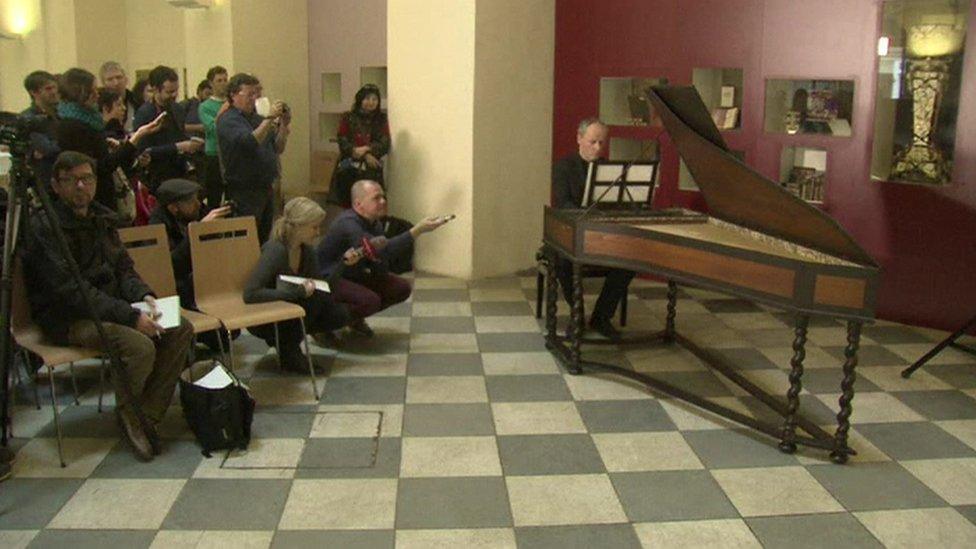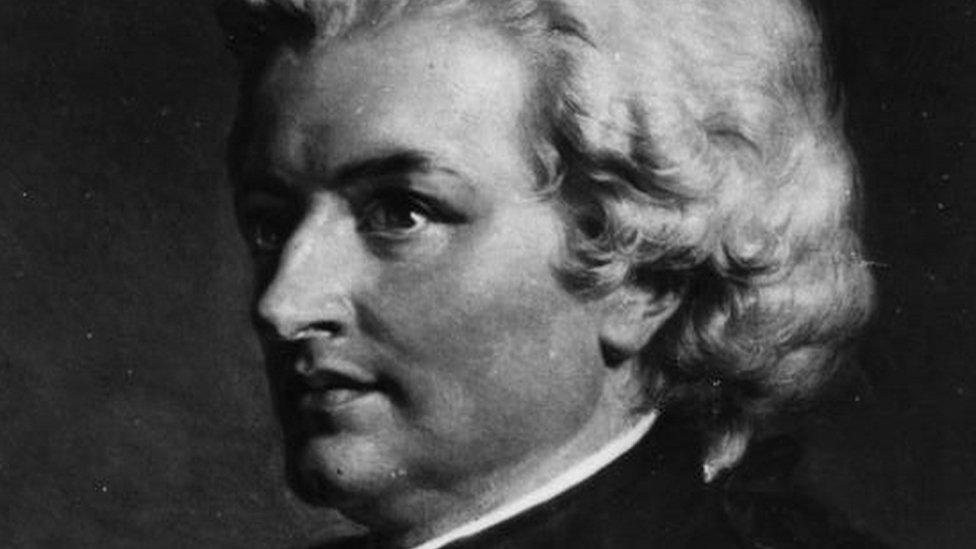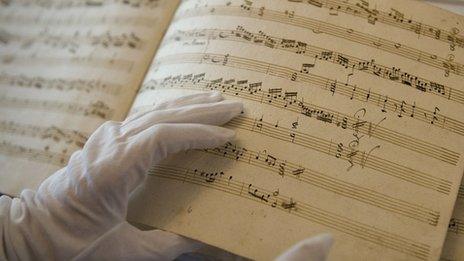Mozart and Salieri 'lost' composition played in Prague
- Published
German musicologist and composer Timo Jouko Herrmann explains its significance to classical music
A piece of Mozart music considered lost for more than 200 years has been performed for the first time since being rediscovered.
It was co-written by him and Antonio Salieri, usually considered a rival, as well as an unknown composer, Cornetti.
The four-minute cantata was found in the archives of the Czech Museum of Music in November 2015 and played on harpsichord for an audience on Tuesday.
A museum spokesperson, Sarka Dockalova, said it was "a really valuable work".
The score, written in 1785, was acquired by the museum in a collection of material in the mid-20th century but its composers were identified in a code that has only recently been deciphered.
Listen: World Service, Lost Mozart score revealed
A German musicologist and composer, Timo Jouko Herrmann, recognised the name of the piece while browsing the museum's online catalogues.
He said the work is "key to a new understanding of the relationship between Mozart and Salieri".
Deadly jealousy?
Rumours that Salieri fatally poisoned his rival Mozart out of jealousy have long been discounted by historians, but were popularised by several plays and an Oscar-winning film, Amadeus.

Harpsichordist Lukas Vendl played the forgotten cantata for reporters in Prague on Tuesday
"We all know the picture drawn by the movie Amadeus," said Ulrich Leisinger, from the Mozart Institute of Salzburg.
"It is false. Salieri did not poison Mozart, but they both worked in Vienna and were competitors."
What the 1984 film Amadeus gets wrong
The cantata's name, "Per la ricuperata salute di Ophelia", translates into English as "For the recovered health of Ophelia". It was written to celebrate soprano Nancy Storace's recovery after an illness.
The text to the piece was written by a Viennese court poet called Lorenzo Da Ponte, who often worked with Salieri.
Mr Leisinger said the piece is "not great" but "really sheds new light on Mozart's daily life as an opera composer".
"It is clearly the original piece and there is no reason to doubt it is genuine.
"We don't know when any other piece by Mozart is discovered, it could be soon but it could also be after another 100 years."
Several Mozart pieces have been re-discovered in recent years, several of them thought to have been written when he was a young boy.


Who was Mozart?
Wolfgang Amadeus Mozart was born in Salzburg in 1756, the son of a violinist at the court of the local Prince-Archbishop.
His father, recognising the boy's extraordinary musical talents from an early age, took him on performing tours throughout Europe so that he could be exposed to as wide a range of music and culture as possible.
The constant travelling may have contributed to his lifelong poor health, but it was doubtless also a major factor in the formation of his cosmopolitan musical style.
A commission from Munich led to his first great opera, Idomeneo (1781), a work into which he poured all of the musical experience he had so far gained.
That year, he moved from Salzburg to the musically more sophisticated Vienna, where he embarked on the life of a freelance composer, pianist and teacher.
At first he enjoyed considerable success. There followed three of his greatest operatic masterpieces - The Marriage of Figaro (1786), Don Giovanni (1787) and Così fan tutte (1790) - but by the time of the last his popularity had waned and he found himself seriously in debt.
He died in December 1791, not long after the successful premiere of his final opera, The Magic Flute. He was 35 years old.
- Published23 March 2012
